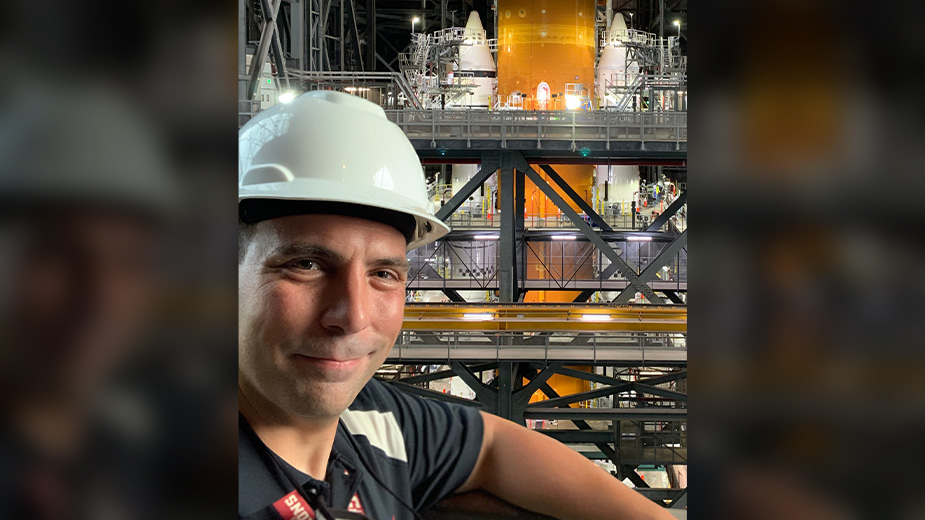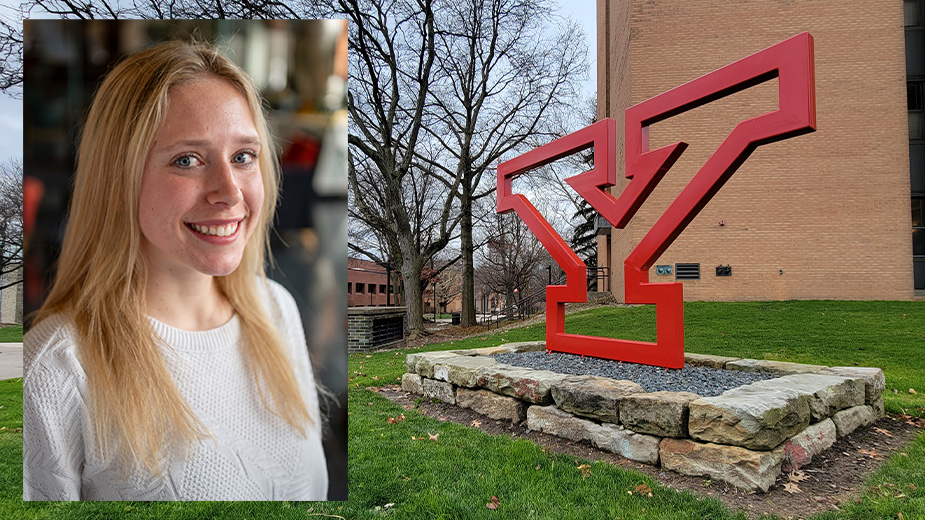KSU Trumbull to Prepare Students for High-Tech Manufacturing Jobs
CHAMPION, Ohio – Through a partnership with Intel, Kent State University is working to prepare the workforce for the jobs that companies will bring to the region and other positions in electrical and electronic engineering.
KSU at Trumbull in Champion is offering an associate of applied science degree in electrical/electronic engineering technology. It’s also offered at KSU at Tuscarawas.
“During the pandemic or pre-pandemic, the chip shortage began to happen because we are manufacturing everything outside of the country and we are depending on other countries,” says Flavia Inbanathan, assistant professor in electrical engineering technology at KSU at Trumbull.
Now Intel is building its manufacturing complex outside of Columbus and will need workers with diverse skills in advanced manufacturing.
About 11,100 new jobs in electrical and electronic engineering technology are projected each year over the next decade in the United States, according to the Bureau of Labor Statistics.
“The recent statistics from the Semiconductor Industry Association, dated July 25, 2023, tells that there is a need for 26,400 technician jobs pertaining to the semiconductor industry [by 2030],” Inbanathan says.
“It’s not only for chip manufacturing but for the EV industry,” she says. “We need these technicians.”
Students can learn those skills while earning an associate degree at KSU at Trumbull. Inbanathan is also working to secure approval for certificate courses for semiconductor manufacturing technicians. “We are offering different pathways,” she says.
The director of engineering technology at KSU at Tuscarawas, Paul Dykshoorn, says the goal is to prepare students for careers in technology.
That’s not only at Intel.
“I think I’ve heard it said that the average American spends 12 hours a day interacting with a computer chip to some degree whether it’s their cellphone, their car, their computer, what have you,” Dykshoorn says.
Besides microchips, there’s also drone technology, power generation, robotics and other areas where electronics is becoming more important.
“We live in an electronic age and to prepare students for that. I think it is important,” he says. “The nice thing we have at our regional campuses is we offer an associate degree.”
In two years, students who earn those associate degrees are employable in the field of electrical engineering technology. “There’s a lot of bang for a buck there,” Dykshoorn says. “Our two-year degree fits in seamlessly with our four-year engineering technology degree.”
The certificate will feed into the associate degree. Individuals can earn an associate degree at either the Trumbull or Tuscarawas campus. The baccalaureate is available at Tuscarawas but can be done mostly online.
Making Microchips
The microchip process involves a silicone wafer and using lithography to transfer design onto the wafer.
“Then we slice this wafer into small, small chips,” Inbanathan says. “This chip goes into your device and my device. Whatever is needed for the chip to work, that is the design we’re transferring using some printing techniques.”
It also involves an etching process, eliminating unwanted materials from the surface of the wafer.
Because of the precision required, some aspects of the process must be executed in a clean room – that is, free of impurities. Even the smallest impurity will ruin a design.Technicians don safety suits to do the work.
This summer, students in STEM-focused majors participated in a summer institute at the main Kent campus.
Vivi Fragou of Bridgeport is interested in electrical engineering technology. Because of finances, however, she isn’t enrolled at a campus. She participated in the summer institute.
“I learned a ton,” she says. “It was a great program.”
Inbanathan points out that jobs in the semiconductor industry provide high salaries.
Fragou likes that aspect but her interest in the field goes deeper. “It’s mentally engaging,” she says. “I like to problem solve so I think it would be interesting for someone who likes to problem solve.”
Patti Neighbor of Uhrichville is a student at KSU at Tuscarawas and participated in the summer institute. “My professors said, ‘You want to go to Intel? Why don’t you do this?’ ” she says.
Neighbor wants to pursue a career in the semiconductor industry; she is intrigued by microchips and the related technology.
“It builds the future so why not ride with it,” she says.
Inbanathan said the field would be ideal for someone who has the ability to manufacture something with precision and who can adapt to the clean room standards. Some computer knowledge is helpful too.
“It’s like a basic cooking process but it’s in a very clean environment,” Inbanathan says. “I have my Ph.D. in semiconductor and nanotechnology. I don’t think you need a specific math [or] you need this much depth of chemistry. It’s nothing like that. You need an open mind to learn. That’s it.”
Intel Collaboration
Intel is partnering with institutions of higher education across Ohio to prepare students for the jobs that will be available.
Kent is working with other colleges and universities in northeastern Ohio to develop academic pathways and virtual curriculum to prepare students to work in semiconductor fabrication.
“It’s the responsibility of the educators to build the workforce. That’s why we have started this,” Inbanathan says.
The institutions developed three courses essential to work in the industry: introduction to semiconductors and the clean room, introduction to manufacturing and introduction to vacuum systems.
“These three are the common courses,” Inbanathan says. “All of the learning material will be uniform across the board at the educational institutions.”
At Kent, those courses are being added to existing courses in the program. “Everyone uses a lot of digital gadgets now. So, obviously, we need to understand what is the brain behind all of these devices …,” she says. “We need to build the workforce related to this so the United States will not depend [on developing nations].”
KSU at Trumbull began to offer high-tech manufacturing 20 years ago. But it was shut down about 10 years ago. “The biggest reason it stopped was because there were no jobs in this area for high-tech manufacturing,” says Ken McElravy, senior facility manager.
He began to teach the program while a student and after the professor suffered health problems. The late Harbans Mathur, who was an assistant professor of technology at KSU Trumbull, began the program.
“He knew it was coming. He was just 20 years too early,” McElravy says.
Dykshoorn agrees. “He was a visionary,” he says.
Few students signed up for the program. Those who completed it and relocated to areas with jobs in the industry did well, McElravy says.
“It’s come full circle in a 20-year period because this is where it all started,” Dykshoorn says, “at Trumbull.”
In the early 2000s, Kent planned to move its College of Technology to the Trumbull campus. The technology building at KSU at Trumbull was built in accordance with those plans.
Plans changed and the technology department didn’t locate to Champion.
High-tech manufacturing equipment remains, however, and some can be used in the revived programs.
“The basics of the technology haven’t changed,” Dykshoorn says. “Obviously, things have gotten smaller and better.”
A mock clean room is expected to be installed but a working clean room is available at the main campus.
Dominic Bauer of Leavittsburg and Jackson Puruczky of Parkman are enrolled in the electrical engineering program at the Trumbull campus. Inbanathan is their professor.
“I am planning on going to more of a labor job,” Puruczky says. “Most of the other jobs are kind of like learn on the go. You can pick up the trade while you’re working. Electrical, you have to know what you’re doing. So I thought, if I was going to get a degree, I would want it in something I couldn’t just learn from someone else. I would want to learn the right way.”
Puruczky wants to learn by doing and plans for a career in electrical engineering where he’s designing and building his own things, “almost like an inventor,” as he puts it.
The hands-on learning aspects of the field appeal to Bauer. He wants a career where he can build circuit boards and design them.
“I decided to go with this because it’s a little more hands-on learning and I’ll be doing something more than just sitting in a classroom,” Bauer says.
Pictured at top: Gathered in the lab are Paul Dykshoorn, director of engineering technology at KSU at Tuscarawas; students Dominic Bauer and Jackson Puruczky; Vivi Fragou and Patti Neighbor, participants in Kent’s Summer Institute; and Flavia Inbanathan, KSU at Trumbull assistant professor of electrical engineering technology.
Copyright 2024 The Business Journal, Youngstown, Ohio.


